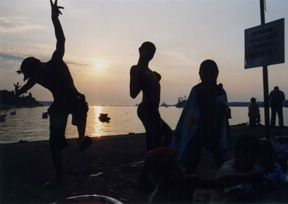The Pier of Apolonovka
Am Pier von Apolonovka GERMANY / 2008 / Ukrainian / Color / Video (HD) / 85 min
GERMANY / 2008 / Ukrainian / Color / Video (HD) / 85 min
Director, Script: Andrei Schwartz
Editing: Inge Schneider
Photography: Marcus Winterbauer, Susanne Schüle, Eva Neymann
Sound: Andreas Turnwald, Helge Haack
Producer: Ernst Ludwig Ganzert
Production Company: Eikon
World Sales: Autlook Filmsales GmbH (Peter Jäger)
Summer at Sevastopol Bay, Ukraine. In the shadow of huge warships moored in the harbor, men make a living off the scrap they collect from the sea floor, young people dive joyously off the pier, and elderly folks swim peacefully early in the morning. Days ease by in the small port town where stagnation and a kind of gentle liberation co-exist. Men and women of all ages appear, warts and all, brought to the wharf by the smell of summer, and we are drawn in by the beauty of their existence within a single transient season.
[Director’s Statement] I call them “albatrosses,” those people on the pier of Apolonovka.
When I first saw them, I was reminded of Visconti’s Rocco and His Brothers: their faces bore that same mixture of grace and vulnerability. At the end of a short-lived flight comes the crash. The Apolonovka albatrosses are the emblem of the intractable dilemma in which their hometown, Sevastopol, finds itself; it is a city much too poor for pomp and glory and much too vital to be scrapped. These boys and girls, though, are the embodiment of its desires and, perhaps, its hope.
“Why bother struggling if your wings have been clipped to the quick? Go ahead and jump . . .” I wrote these words in 2001. At the time I could hardly have guessed that we’d need so long to gain financing and finish the film. The then-twelve-year-olds were by now eighteen and had long since vanished from Apolonovka. Some of them for good. Like Vitja, whose pose in the air originally gave me the idea of albatrosses. Vitja died of a heroin overdose at the age of seventeen.
For some a long process is a blessing; to me it was a curse. After all, the faces of the boys and girls were the inspiration of the film, not its theme. In time it occurred to me that nothing but the idea remained. Or, rather, its lifeless skeleton—in the form of a treatment. Fortunately the pier and the good lighting remained, too.
Finally, after six years, we had enough money to start filming. And so I went out looking for new faces that reminded me of the older ones. And then one day, after hundreds of rough cuts, my camera woman, Susanne Schüle, said that the film now reminded her of the original treatment. I hope she’s right.
 Andrei Schwartz
Andrei Schwartz
Born in 1955 in Bucharest, Romania. Since 1973 he has lived in Germany. He studied art history at the University of Hamburg and visual communication at the Art College of Hamburg. In 1987 he began to work as an assistant director and correspondent for radio stations and newspapers. Since 1991 he has worked as an independent director and writer of documentaries. For Wasteland (1997) Schwartz received the Joris Ivens Award at the International Documentary Film Festival Amsterdam, the Blue Ribbon at the Hot Docs Canadian International Documentary Film Festival, and the Civis Media Prize. Other films include Tales from Leper Valley (2001) and Jailbirds (2005). His films have been shown at many other festivals, including the Berlin International Film Festival, the Locarno International Film Festival, DOK Leipzig, the Krakow Film Festival, and EURODOK Oslo. |
